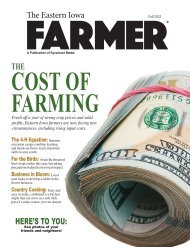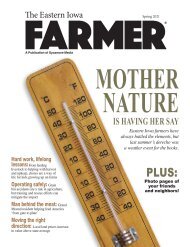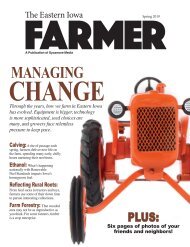Eastern Iowa Farmer Fall 2020
You also want an ePaper? Increase the reach of your titles
YUMPU automatically turns print PDFs into web optimized ePapers that Google loves.
Ag education helps shape<br />
college, career choices<br />
By JENNA STEVENS<br />
Ag in the Classroom<br />
Coordinator<br />
Clinton County Farm Bureau<br />
EASTERN IOWA FARMER<br />
Growing up on a farm my<br />
experiences were typical of<br />
most area farm kids. I showed<br />
livestock at the fair, took ag<br />
classes, and served as an FFA officer in<br />
my chapter.<br />
What made me less typical was the<br />
fact that I did not want to be involved in<br />
agriculture when I graduated high school.<br />
Years of showing cattle competitively left<br />
my relationship with my parents strained,<br />
and I could not wait to get away from the<br />
farm and out on my own.<br />
Fast forward 17 years, and I now<br />
spend my time working with those same<br />
students I used to be…and I love every<br />
minute of it. Time away from the industry<br />
gave me the chance to reflect on what<br />
is important, and now, instead of trying<br />
to run away, I push my students toward<br />
careers in agriculture every chance I get.<br />
My favorite group of kids to work with<br />
are my FFA members because I see the<br />
impact agriculture has on their decisions<br />
of where to go to college and what they<br />
want their careers to look like. It is fun<br />
to watch them try out different identities<br />
when they are freshman and sophomores<br />
and eventually get serious about their<br />
futures their senior year.<br />
Like me, some of them decide on a<br />
different path, but most of them stick with<br />
what they know, making plans for careers<br />
in ag business, sales, or communications.<br />
The best compliment I ever received was<br />
from one of my students who originally<br />
planned to go into medicine but changed<br />
her mind in favor of agricultural communications<br />
as a direct result of the work she<br />
did for our Current Ag Concerns Media<br />
Group. This shift represents her coming<br />
into her own within the industry and<br />
<strong>Eastern</strong> <strong>Iowa</strong> <strong>Farmer</strong> photo / Jenna Stevens<br />
Central DeWitt Community High School students work in the greenhouse to learn more about<br />
plant science. Here students Jordan Auliff, Levi Riedesel, and Jenevieve Schmidt propagate<br />
succulents for horticulture class.<br />
finding her voice through radio and print<br />
media.<br />
At the heart of a student’s decision<br />
to go into a specific agricultural-related<br />
career is often their high school agricultural<br />
education courses. These courses<br />
allow students to engage in hands-on<br />
learning about plants, animals, business,<br />
and more and give them the chance to<br />
sample subjects, in some cases earning<br />
free college credit. Throw FFA into the<br />
mix with the endless career development<br />
events (CDEs) and kids have a head start<br />
down the path toward success.<br />
In addition to the college credits offered,<br />
the ag education programs at local<br />
high schools connect students to business<br />
professionals within the community. Students<br />
have the chance to take field trips to<br />
places like John Deere or listen to guest<br />
speakers talk about their roles within area<br />
companies. These opportunities allow for<br />
question and answer sessions and often<br />
come with action-based experiences such<br />
as trying out a welding simulator or separating<br />
out worm castings.<br />
Sometimes these guest speakers or field<br />
trip experiences turn into summer jobs or<br />
internships within area businesses. Local<br />
companies often contact ag education instructors<br />
for recommendations of students<br />
who might be interested in learning more<br />
about a specific career and earning a little<br />
extra cash.<br />
No matter what path they eventually<br />
choose, students who take agricultural education<br />
courses in high school have a leg<br />
up on others because ag ed is one of the<br />
few programs that builds career exploration<br />
directly into the curriculum.<br />
In the world of rising college costs<br />
and ever-changing job markets, gaining<br />
skills in high school sets your child up for<br />
future success and that success starts with<br />
agricultural education. n<br />
112 <strong>Eastern</strong> <strong>Iowa</strong> <strong>Farmer</strong> | fall <strong>2020</strong> eifarmer.com
















